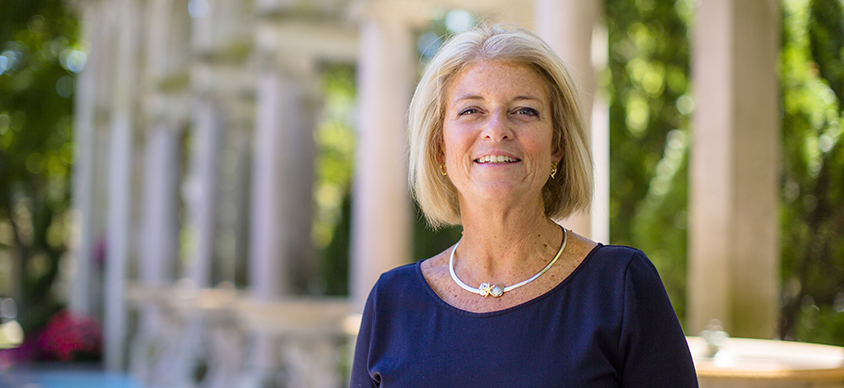Extending a Lifelong Relationship
Lucille Flynn '83 knows how to choose the right university. After more than three decades working in higher education, Flynn advises students that comfort is a key factor.
“Parents and students often come to me and ask me, ‘What should I be looking for?' And I ask them a question in return; when you walk on that campus do you feel comfortable? Is this a place where you want to spend four years? If you don't like the environment, then maybe you should rethink whether that school is right for you.”
Flynn speaks from experience. Growing up in Howell, N.J., she knew she would be the first person in her family to go away to school. She remembers taking a campus tour of Seton Hall with her parents and immediately feeling that she had found a home. “It was the best four years of my life,” she said. “The friends I made there are still my closest, dearest friends today.”
Seton Hall did more than provide an academic home; when Flynn's father passed away while she was a student, she credits the University with helping her entire family through that difficult time.
"They helped my mother with what needed to be paid, and the professors were very supportive to me in my classes,” she said. “But what I remember most is being at the funeral, looking up, and seeing four priests from Seton Hall on the altar. That let me know I wasn't just a number.”
Flynn's undergraduate experience provided the foundation for an enduring relationship with the University and a career in higher education. She returned to campus a year after graduating to work in the admissions office. That first job launched her on a professional path at other universities and her current position as associate vice president for external affairs at Monmouth University.
Despite her professional affiliation at another university, she has volunteered for Seton Hall in many capacities over many years, chairing reunion committees, organizing alumni participation in the Belmar St. Patrick's Day Parade and planning countless events.
Five years ago, she and her husband, Kevin, wanted to do more, but they weren't in a position to make an outright major gift at the time. So they decided to name the University as a beneficiary in their will. She informed the University's Office of Gift Planning of their decision and forwarded a page from their will indicating that the University will receive a percentage of their estate.
“My husband and I have no children, and we both enjoy professional success in our careers, so I know that our gift will eventually endow a scholarship,” Flynn said. “I may not know the students, but they'll know a little about me and understand how important it is for me that they earn a degree.”
She chose this gift specifically because her work in higher education has taught her about the transformative power of scholarship support. “I meet with students and I hear their stories, and sometimes I have the privilege of calling them and telling them they are getting a scholarship award as part of their overall financial aid package and I hear crying on the other end,” she said. “That money makes a difference; it means they won't need to take a third job or they won't have to drop out.”
And of course, she is particularly pleased that her philanthropy will support an institution that is close to her heart. “I know that Seton Hall has grown, but I get the impression from friends' children who go there that the feeling of family is still the same.
“I'm very happy to hear that.”
At a Glance: Bequests
- Charitable bequests are made by naming Seton Hall as a beneficiary in your will or living trust. This type of gift does not affect your cash flow.
- Your assets remain in your control during your lifetime. You can modify your gift at any time should circumstances change.
- You can direct your gift to the area of Seton Hall's mission that is most meaningful to you.
- We can provide you with model bequest language and will work with you on the details.


